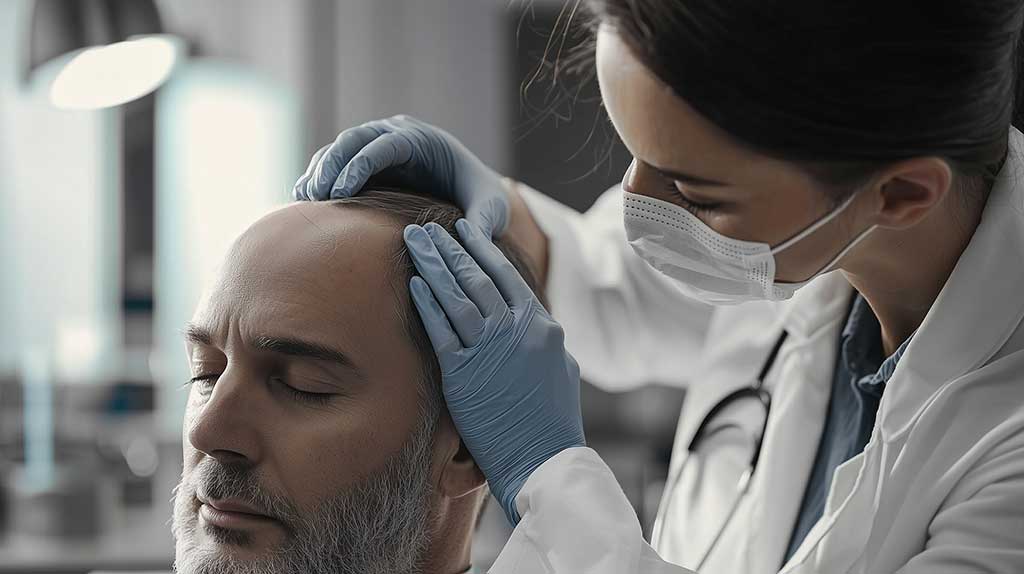
Hair Transplant : what are the risks and how to avoid them ?
Hair transplantation is an increasingly popular surgical procedure among individuals suffering from alopecia (or hair loss). It simply involves reimplanting hair into areas of the scalp where significant or permanent hair loss has occurred. Effective and long-lasting, it’s the ideal solution for those struggling with self-confidence due to hair loss. However, before undergoing the procedure, it’s important to be aware of the potential risks and side effects of a hair transplant. Here's everything you need to know!
Hair transplantation is an increasingly popular surgical procedure among individuals suffering from alopecia (or hair loss). It simply involves reimplanting hair into areas of the scalp where significant or permanent hair loss has occurred. Effective and long-lasting, it’s the ideal solution for those struggling with self-confidence due to hair loss. However, before undergoing the procedure, it’s important to be aware of the potential risks and side effects of a hair transplant. Here's everything you need to know!
What are the risks after a hair transplant ?
Like any surgical procedure, a hair transplant can lead to side effects and risks.
Side effects
Here are the possible side effects after a hair transplant:
- Mild pain or discomfort on the scalp;
- Sensitivity in the treated area;
- Redness;
- Swelling;
- Minor bleeding;
- Scab formation around the transplanted follicles;
- Itching from the formed scabs;
- Loss of the newly transplanted hair.
These side effects are common and not serious. They are part of the healing process and usually resolve quickly in most patients. The loss of newly transplanted hair, in particular, can be alarming, as many patients may fear a failed procedure. Don’t worry—it’s not a cause for concern. It actually occurs due to the fragility of the new hair follicles. Your hair will grow back stronger afterwards.
Risks
Unfortunately, there are also some risks associated with hair transplants:
- Infection;
- Heavy bleeding and hematoma formation;
- Loss of sensation in the scalp;
- Hypertrophic scar formation;
- Allergic reactions;
- Tissue necrosis around the grafts;
- Permanent loss of nearby natural hair (shock loss).
These risks are relatively rare and are often due to a poorly performed surgical procedure or lack of proper post-operative care.
Infection can range from mild to severe; in all cases, it is treated with antibiotics.
Tissue necrosis is a rare but serious risk. It may occur if post-operative bleeding is overly restricted, or if there is poor blood circulation in the scalp. In case of tissue necrosis, you should contact your doctor immediately for prompt treatment.
Finally, shock loss is another risk that can significantly affect patients. It refers to the partial or total loss of natural hair surrounding the treated areas. If the hair transplant is meant to add density, shock loss can have the opposite effect by causing the remaining natural hair to fall out. Shock loss can be temporary or permanent, and as the name suggests, it is caused by the trauma of the surgical procedure. Medical support is recommended.
How to avoid risks associated with hair transplants ?
To minimize the risks of a hair transplant, it's essential to choose the right clinic and a skilled surgeon. Also, proper preparation for the procedure and diligent post-operative care are crucial!
Choosing the right surgeon
Above all, make sure you're in good hands. Don’t just go for the cheapest clinic. Regardless of your budget, the cost is less important than the success of your procedure!
Opt for a reputable clinic and a certified, experienced surgeon who specializes in hair transplants. If needed, ask for recommendations or read verified reviews to ensure you make the right choice.
Proper preparation for the surgery
Before your hair transplant, it's important to prepare your body for the procedure. A healthy lifestyle is essential to maximize your chances of a successful outcome!
First, you'll need to undergo a blood test to determine whether you're eligible for a hair transplant.
If you are, your doctor will give you several recommendations to follow before the surgery. In the days leading up to the procedure, maintain a healthy lifestyle: eat nutritious foods, stay hydrated, get enough sleep, and avoid taking vitamins or medications. If you smoke, stop several days before the procedure, as nicotine can impair proper tissue healing.
The day before your transplant, wash your hair with shampoo to stimulate the scalp. Make sure to rinse thoroughly and do not apply any products afterward.
Don't neglect post-operative care
After your hair transplant, follow these recommendations to promote optimal healing:
- Get plenty of rest and avoid lifting heavy objects;
- Spray a moisturizing mist on your grafts every hour;
- Do not touch your grafts;
- Avoid leaning your head forward;
- Avoid tea, coffee, alcohol, and medications like aspirin;
- Start shampooing 4 days after the procedure, then every 2–3 days to remove scabs.
The clinic will usually provide you with the appropriate shampoo and moisturizing spray.
Your surgeon may also prescribe pain relief medications, supplements to aid healing, or a lotion to apply to your grafts during the first few days.
If you’re employed, make sure to take sick leave. One day may suffice if you work a sedentary job, but if your work is physically demanding, plan to rest for a full week.
Lastly, avoid anything that could rub, scratch, or pull on your grafts. For instance, wear loose-fitting clothes or tops that don't go over your head. Also, during the first few nights, sleep on your back with your head elevated.
By following all these tips, you'll greatly increase the chances of a smooth and risk-free recovery!

Dr. Levent Acar - Docteur